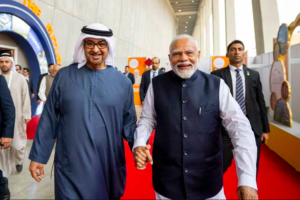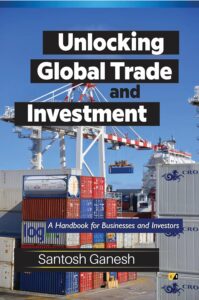
The Comprehensive Economic Partnership Agreement (CEPA) inked between India and the United Arab Emirates (UAE) in May 2022 has emerged as a pivotal development in the landscape of bilateral economic cooperation. Touted as a game-changer, this agreement holds the promise of reshaping trade dynamics, spurring investment flows, and fostering deeper collaboration between the two nations. In this comprehensive exploration, we embark on a journey to decode the multifaceted CEPA, unraveling its provisions and examining the potential impact it holds for businesses and individuals in India and the UAE. From tariff reductions to liberalization measures, from the intricate world of trade in goods to the burgeoning sectors of services and investment, we delve into the core aspects of CEPA, shedding light on its transformative potential and the challenges and opportunities it presents.
Trade in Goods:
At the core of CEPA lies a groundbreaking shift in trade dynamics. It effectively eliminates or substantially reduces tariffs on more than 80% of India’s exports to the UAE and over 90% of the UAE’s exports to India. This translates into a palpable reduction in costs for businesses and consumers alike, serving as a catalyst for the expansion of trade volumes. The agreement casts a wide net, covering an extensive array of goods, encompassing pharmaceuticals, textiles, agricultural products, electronics, machinery, and food items. This comprehensive coverage holds the promise of newfound market access opportunities for both nations. To ensure the integrity of trade practices, CEPA establishes lucid rules of origin. These rules are instrumental in guaranteeing that only goods genuinely produced in India or the UAE qualify for preferential tariff treatment, thereby erecting safeguards against unfair trade practices and shielding local industries.
Trade in Services:
CEPA heralds a new era in trade in services, particularly in sectors such as healthcare, education, IT, and audio-visual services. It effectively dismantles barriers and facilitates access for Indian professionals and service providers to the UAE market. This newfound access creates exciting prospects for Indian professionals and businesses, enabling them to broaden their horizons. The agreement’s liberalization measures streamline licensing procedures and dismantle regulatory hurdles for service providers, making it significantly easier for them to operate within each other’s markets. Furthermore, CEPA actively encourages collaborative endeavors and partnerships between Indian and UAE service providers, fostering a culture of knowledge exchange and innovation within the sector.
Investment:
CEPA brings a wind of change to the investment landscape by liberalizing regulations, which, in turn, paves the way for increased foreign direct investment (FDI) flows between the two countries. This shift is poised to attract substantial investments in pivotal sectors such as infrastructure, renewable energy, and logistics. To assure investor confidence and security, the agreement establishes a transparent and efficient mechanism for the resolution of investment disputes. Beyond liberalization, CEPA champions the spirit of collaboration by actively encouraging joint ventures and partnerships between Indian and UAE companies. This emphasis on collaboration holds the potential to foster technological advancements and shared expertise.
Other Key Provisions:
In addition to trade and investment, CEPA addresses critical aspects like intellectual property protection, e-commerce, and government procurement. The agreement strengthens intellectual property rights, thereby fostering innovation and creativity in both India and the UAE. It also takes bold steps to promote cross-border e-commerce, facilitating the seamless flow of digital goods and services. Furthermore, CEPA throws open the doors of government procurement markets to both countries, creating novel opportunities for businesses to explore.
Impact of CEPA:
CEPA is poised to usher in transformative changes with significant implications:
- Increased Trade and Investment: CEPA is projected to deliver a substantial boost to bilateral trade and investment flows.
- Job Creation: The heightened economic activity is expected to spawn new job opportunities in both countries.
- Economic Growth: CEPA has the potential to contribute significantly to the overall economic growth of both India and the UAE.
- Enhanced Cooperation: The agreement encourages deeper cooperation across various sectors, promoting knowledge exchange and technological advancements.
Challenges and Opportunities:
While CEPA presents remarkable opportunities, some challenges must be addressed:
- Non-Tariff Barriers: Despite tariff reductions, non-tariff barriers such as complex customs procedures and regulatory hurdles could persist, impeding trade.
- Logistics Bottlenecks: Streamlining logistics infrastructure and enhancing connectivity is imperative for fully realizing the increased trade potential.
- Awareness and Capacity Building: Businesses in both countries need greater awareness of the benefits and opportunities offered by CEPA. Capacity building initiatives and collaborative efforts can bridge this awareness gap.
CEPA emerges as a landmark agreement poised to redefine India-UAE economic relations. Through the facilitation of new market access, the promotion of investment flows, and the encouragement of deeper cooperation, CEPA holds the potential to contribute significantly to the economic prosperity of both nations. As businesses and governments join hands to effectively implement this agreement, the future of the India-UAE economic partnership appears exceptionally promising and radiantly bright.

India-UAE Ties: Strengthening Strategic and Economic Bonds
The relationship between the United Arab Emirates (UAE) and India has evolved into a robust alliance, marked by strong strategic and economic ties. Since assuming office in 2014, Prime Minister Narendra Modi has actively worked to bolster these relations further. The UAE stands as India’s third-largest trading partner and its second-largest export destination. A significant milestone in this burgeoning partnership is the Comprehensive Economic Partnership Agreement (Cepa), which has had a transformative impact on bilateral trade. In the first nine months of 2022, the trade volume surged to $38.6 billion, nearly double that of the same period in 2020.
During a visit by Sheikh Mohamed bin Zayed Al Nahyan, the Crown Prince of Abu Dhabi, to India, several crucial agreements were inked across key sectors. One of the highlights of this collaboration is the investment in renewable energy projects, aiming to reach up to 60 gigawatts in India. This aligns with India’s commitment to transitioning to clean energy, striving for net-zero emissions by 2070 and achieving 50% of its electricity needs from renewable sources by 2030. Plans are also underway to enhance India’s renewable energy capacity to a staggering 500 gigawatts, significantly reducing carbon emissions.
Another significant facet of the partnership revolves around the development of integrated food parks in India. These parks will employ state-of-the-art climate-smart technologies to minimize food waste, conserve water, and maximize crop yields. By bringing together farmers, processors, and retailers, these parks are set to revolutionize India’s food ecosystem.
In the realm of healthcare, the two nations are venturing into projects focusing on personalized healthcare based on an individual’s genetic, genomic, or biological composition. A Genomic Centre of Excellence is under consideration as part of this initiative, harnessing India’s $372 billion healthcare sector.
Furthermore, India and the UAE have shown their commitment to strengthening economic ties by settling trade in the Indian currency, rupees, instead of US dollars, simplifying transactions and fostering economic cooperation.
The Indian diaspora in the UAE is the largest globally, with 3.5 million Indian nationals residing in the Emirates in 2021. These individuals contribute to various sectors, from finance and education to healthcare, reflecting the diversity and dynamism of this vibrant community.
As Prime Minister Modi gears up for his visit to Abu Dhabi in February, where he will inaugurate the BAPS Hindu Temple and attend community events, it underscores the deepening cultural and people-to-people ties between India and the UAE. This thriving partnership continues to strengthen, promising mutual prosperity and cooperation for years to come.







